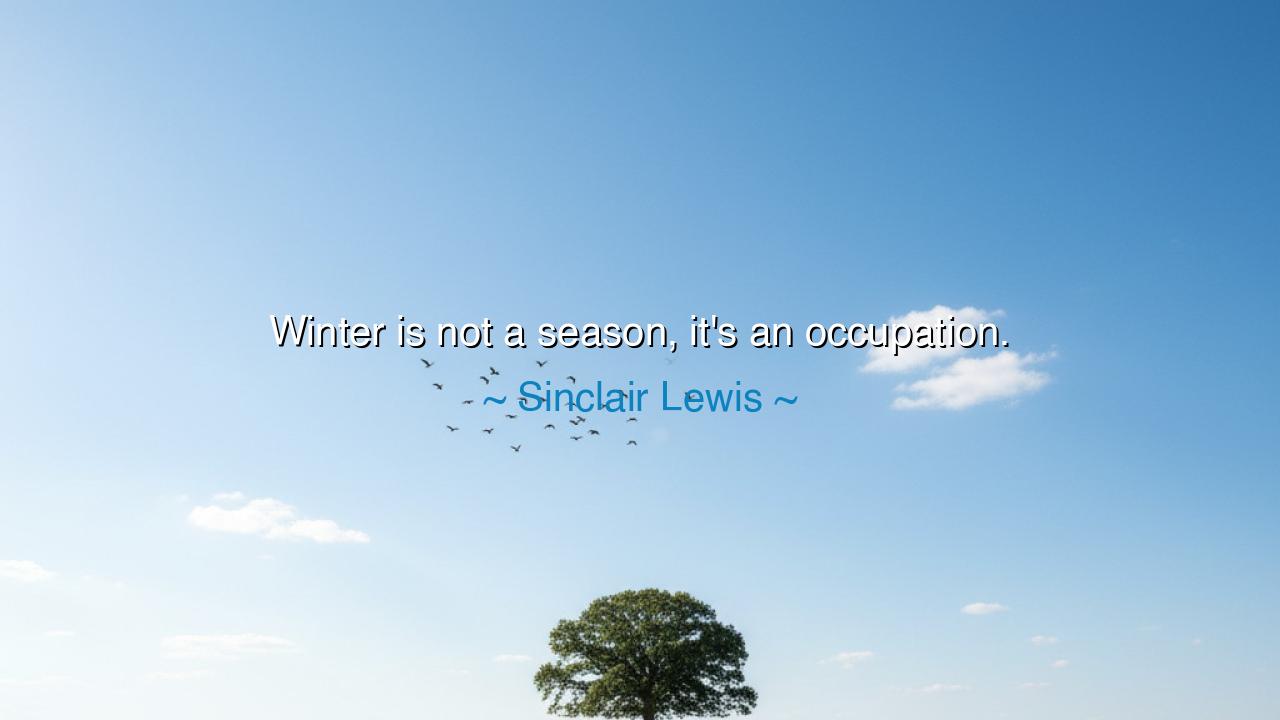
Winter is not a season, it's an occupation.






Sinclair Lewis once proclaimed: “Winter is not a season, it’s an occupation.” In these words lies more than a witty turn of phrase—there lies a vision of endurance, of discipline, and of the unyielding labor that life demands when the world grows cold. For winter is not a gentle visitor, but a commander that sets tasks for body and soul alike. It demands preparation, vigilance, and resilience, turning life itself into work. It is not simply a page of the calendar, but a calling that requires action, strength, and unbroken spirit.
The origin of this thought can be traced to Lewis’s own roots in the northern lands of America, where snow and frost do not merely decorate the year, but dominate it. In such places, winter presses hard upon daily life. One must not only endure the cold, but labor to survive it—shoveling, chopping, mending, gathering, and guarding against its trials. Thus, to Lewis, the season became more than weather; it was a duty, a daily employment, where every hour of warmth or sustenance was earned by toil. His words are born from this lived truth, and they remind us that harsh times are not simply endured, but worked through.
The ancients, too, understood winter not as passive time, but as active struggle. The Norse sagas speak of Fimbulwinter, the great and endless winter before the twilight of the gods, when men would live only through courage and relentless preparation. The Romans honored Saturn in the depths of the cold, celebrating the labor of sowing and storing that alone preserved life through barren months. To them, winter demanded not idleness, but industriousness—a season where human will must be as relentless as the ice.
Consider the tale of Napoleon’s march into Russia in 1812. His armies, vast and mighty, were undone not by spears or swords, but by the ceaseless occupation of winter. The cold seized men’s limbs, the snow buried their supplies, and hunger gnawed more fiercely than any enemy. Those who survived did so not by brilliance of strategy, but by clinging to endurance, resourcefulness, and the hard work of survival. In this story we see clearly that winter is no passive backdrop, but an active force—an occupation that breaks the unprepared and hardens the steadfast.
The meaning for us is clear: winter is not only of ice and snow, but a symbol of the trials that life sets before us. There are winters of the spirit—times of grief, of loss, of hardship—when the soul must labor as though employed by sorrow itself. These are not seasons we pass through idly, waiting for warmth to return. They are occupations of endurance, where each act of courage, each small labor of hope, is a task completed in service of survival. And just as the farmer who labors in cold secures the harvest of spring, so too do we, by working through our winters, secure the bloom of better days.
Thus, the lesson is this: when winter comes to you—whether in the body or in the heart—do not treat it as mere passing weather. Treat it as your appointed work. Rise each day to the labor of perseverance. Chop the wood of discipline, gather the fuel of patience, tend the fire of faith. Let no hardship make you idle, for in idleness, winter conquers. Instead, let hardship become your teacher, shaping you into one who endures and prevails.
In your own life, prepare for your winters before they arrive. Save in times of plenty, so that scarcity does not break you. Build habits of strength when days are easy, so that when hardship comes, you do not falter. And when you find yourself already within the cold, do not despair—see in it the sacred occupation of endurance, which carves character as ice carves the mountain. Remember that no occupation lasts forever, and that the work you do in winter will be crowned with the blossoms of spring.
Therefore, hold close Sinclair Lewis’s wisdom: “Winter is not a season, it’s an occupation.” For the harshest times of life are not simply to be suffered, but to be labored through with courage and strength. To treat hardship as work is to transform despair into duty, and duty into triumph. And in that triumph, you will find not only the return of spring, but the discovery of your own unbroken spirit.






AAdministratorAdministrator
Welcome, honored guests. Please leave a comment, we will respond soon